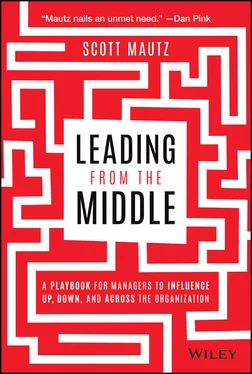Being in the messy middle means dealing with some unique emotions. It can mean a sense of alienation, isolation, and loneliness, as being in the middle makes it hard to really be a part of anyone's group. Employees can stay at arm's‐length, as can bosses, and yet the middle manager attracts and absorbs discontent from every angle, adding to the emotional toll. I've heard many of those who lead from the middle describe feelings of being overworked and underappreciated, expressing great frustration over wanting to change things around them but being unable to do so, not feeling like they can control enough of their destiny. Not to mention that middle managers are often the target of layoffs or can be displaced on the promotion path by outside hires, which can take a huge emotional toll on one's self‐esteem and sense of fairness in the world.
While the scope (SCOPE) of what makes leading from the middle so messy can feel daunting, it doesn't have to. Through decades of research and experience I can share with you a framework, or actually a reframework, to help you reframe the way you see, experience, react to, and ultimately resolve each of the specific difficulties outlined. (We'll get into the overall mindset required to thrive as a leader in the middle in the next chapter.) Let's go through the SCOPE acronym again, this time armed with reorienting insights to help reframe and reshape the way you view the inherent, unique difficulties associated with leading from the middle.
While you're constantly switching roles and changing hats, in flux between high‐power and low‐power situations, your identity is never actually in flux, even though it might feel like it. An organization is like the human body, it needs a healthy, flexible core. If you strengthen your middle, you strengthen your entire body. If you strengthen the middle of the organization, you strengthen the entire organization. You are the core, flexible center and the center of strength for your company. Take pride in that truth.
Here are some other reframing insights to help you fully appreciate your pivotal place in the organization.
1. You work not in an organization but an organism.And you're the lifeblood of it.
2. You're the ultimate catalyst from which progress pulses, the amplifier.We'll cover this in depth in Chapter 3, “The Skillset for Leading Effectively from the Middle.”
3. You're the keeper of the long and short‐term flame, working on the business and in the business.This is a unique privilege that those leading from the middle experience.
4. You're a lighthouse and a beacon, signaling threats and drawing all toward opportunities.It's a powerful duality. For example, being in the middle means you're best suited to spot external threats from competitors and identify internally generated ideas for innovation.
5. The micro‐transitions you're constantly making aren't segmented, they're integrated.The 100 jobs you belong to add up to one vital job you're uniquely suited to do well. Value the variety.
6. While you might be the “middle child,” the middle child is also resourceful, creative, and independent.Galloway reminded me of this, and she's right. These are all things to take pride in.
Leading from the middle might be rife with tension, but it also means you're in the thick of things, where the real action is. Your job is to embrace constant contradiction, revel in it, and know that thriving in environments of natural conflict is a valued skill in and of itself. When it comes to environments of conflict, you can shirk, shrink, or shine. Choose the latter to climb the ladder.
More reframing insights follow.
1. You're not squeezed in the middle; you have the unique opportunity to impact in all directions.There's no position quite like it.
2. Instead of getting frustrated that you can't specialize when you're in the middle, which makes it difficult to grow your craft, view the action in the middle as your craft.Redefine success as having mastery over nothing except knowing you must know enough of everything, which takes a special breed to do well.
3. Home builders need permission on everything, business builders don't.So stop asking for permission on everything. Expand your authority within reason. For example, align objectives with your boss upfront, and if your intended action will serve the objective, act, don't ask.
4. Sure, you're in a pressure cooker, but you can release one of the valves—the pressure you put on yourself.If you're focused on constant learning and growth, on becoming a better version of yourself each day and not comparing to others, on chasing authenticity instead of approval, pressure becomes an enabler, not a disabler.
5. Know that ongoing conflict is essential to producing the best work.And you have the opportunity to harness conflict for maximum effect. For instance, I always found that our team produced the best ideas the fastest when we engaged in healthy debate, not when everyone agreed quickly. That's something you can facilitate (you'll get help on that in Chapter 3).
6. The reconciling and reprioritizing habits you're building in the middle (side effects of continually dealing with conflict) will serve you at the top, and everywhere else.More so than any other habits you forge.
Not knowing can feel like a cardinal sin when you're leading from the middle. But as much as it might feel like it, your job isn't to know everything. In fact, a client I keynoted for had the following sentence painted on the wall in their headquarters lobby: “There's a cost to knowing.” It's a reminder to their managers that trying to know everything before moving forward comes at the cost of speed, missed opportunities, and more important priorities neglected elsewhere. For certain, it takes time and resources to know things. Make that known and be aware of the tradeoffs involved for having personal knowledge on a subject. Then, discern if it's worth you personally knowing it. In fact, focus more on discerning what you should know than trying to know everything. Just as important is to build a knowledge system where, if you don't have the answer, you can quickly access someone who will.
Then try the insight‐driven plays that follow.
1. Regarding high pressure meetings where you're expected to have all the answers—know what you're truly expected to know, but don't stress out trying to plan for every contingency.Invest the time to prepare for the meeting and anticipate the questions most likely to come up, and be okay with leaning on the knowledge system you've built up for the rest. Ask yourself, “What would the meeting attendees want to know about the subject at hand? What concerns or issues might they have? What are other sources I can have at the ready to answer questions outside my direct realm of expertise?” It's about instilling confidence and an unswerving faith that you and your knowledge system have things covered, not that you personally have the answer to every question.
2. Take pride in what you've chosen not to know.For example, I used to refuse to know some of the smallest details of a project because of the cost of knowing that. I took pride in delegating and empowering others to have the knowledge in certain areas while I focused on knowing enough about that area to be able to ask the right questions and to instill confidence in those evaluating me.
3. Know that it's not about omnipotence, it's about omnipresence.Leaders from the middle should be everywhere in their business, leaving an imprint on virtually everything within their purview (within reason and within boundaries, as I'll discuss in a moment). It requires thoroughly knowing the fundamentals of your business inside and out, but that doesn't come from personally knowing everything. It comes from being present and engaged enough in all aspects of the business (with enough attention to the fundamentals) and by being inclusive and interested enough to engage with all the experts on your business.
Читать дальше












